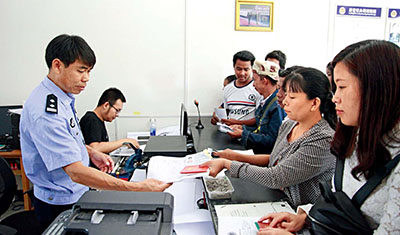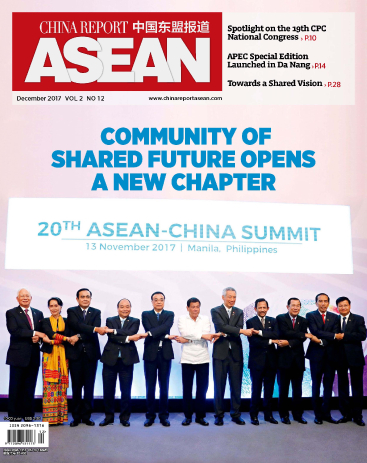Located on the China-Myanmar border, Ruili, a county-level city in southwestern China's Yunnan Province, has seen a constant influx of foreign nationals in recent years. Most are from Myanmar. The city is home to about 50,000 Myanmar people doing business or working in factories. The government of Ruili has made constant efforts to improve foreign population management and has achieved positive results in providing quality administrative services.
One-stop Service
On June 18, 2013, the Foreigners Service and Administration Center of Ruili City was put into operation, the first of its kind in China. According to director of the Center Shao Yongbao, the center receives around 200 applications for temporary residence permits every day. Before the Center was established most foreigners were reluctant to apply for temporary residence permits due to complex procedures. Now, however, the city's streamlined administration has improved the process.
“In the past, Myanmar workers here found it troublesome to apply for the permit because of the language barrier, mazelike procedures and a prolonged application period,” said a worker from Myanmar who lives in Ruili. “But now the situation has greatly improved. We enjoy one-stop service at the Foreigners Service and Administration Center, and many of my countrymen are willing to apply for temporary residence permits, with which our rights and interests here are guaranteed.”
To improve convenience, the Center has set up branch offices in nearby townships, including Jiegao, Wanding, Jiele, Jiexiang and Nongdao, for foreigners to apply for temporary residence permits, health certificates and temporary employment registration by filling out just one form, significantly simplifying the required procedures for foreigners to live, work and do business in Ruili. Since the Center began operating in 2013, it has issued more than 40,000 temporary residence permits for foreigners in the Yunnan Province border region.
Comprehensive System
The key to improved service lies in providing satisfying services covering all aspects. To this end, the public security department, civil affairs department and social security department of the Ruili government have jointly established a comprehensive administration system featuring a homestay management model, two stations and three centers.
The homestay management model refers to the concept and practice of household-based population management in urban communities and villages with high concentrations of foreign nationals. Under this model, foreigners are allowed to live in homestays after real-name registration.
The two stations are the foreign migrants service station and illegal foreign migrants management station. The foreign migrants service station was originally set up to cover industrial parks with a great number of foreigners to provide centralized administration. At the same time, Ruili's police stations are responsible for collection of foreigners’ identity information, providing consulting services and settling disputes. For foreigners who illegally enter, reside or work in Ruili, the police stations will conduct identity checks and provide necessary aid.
The “three centers” refers to organizations established by the Ruili government departments of civil affairs and public security engaged in administrative services for foreigners, including a cross-border marriage registration and documentation center, a center for the settlement of disputes involving foreign nationals and a job center for foreign migrants.
The comprehensive administration system has effectively improved government services and has been widely recognized by the public.
Shangnong’an is an urban village in Ruili. With a large number of houses built by the villagers for rent, many migrant workers from Myanmar have moved here in recent years. At first the villagers didn't consider it a serious issue. But as the number of Myanmar workers grew and some of them committed crimes, the villagers started to worry the village had a security problem.
In this context, the public security bureau of Ruili set up a foreign migrants service station in Shangnong’an village and adopted a homestay management model, allowing foreigners to live in local villagers’ homes after registration. Thus a management network covering the entire city was established with each household as a basic unit. This type of all-round service has helped improve local security.
Thanks to the foreign migrants service station and the household-based management model, the villagers and Myanmar migrants coexist well with one another. Myanmar workers have learned to abide by local laws and regulations. The effective measures not only benefit local residents, but also safeguard the rights and interests of foreigners. Optimized allocation of the labor force is thereby realized, which helps more and more foreign migrant workers lead a stable life in Ruili and greatly reduces potential risks for social instability.
Three Long-term Mechanisms
The public security bureau of Ruili has formulated an Action Plan for Removal of Foreigners Who Illegally Enter, Reside or Work in Ruili, and the illegal foreign migrants management station carries out three rounds of inspections per week to examine and repatriate illegal foreigners.
Officials have also implemented a long-term China-Myanmar public security authorities meeting mechanism. Utilizing the China-Myanmar liaison offices for anti-human trafficking and anti-drug trafficking as a platform, the public security bureau of Ruili has held regular talks with the Myanmar police, promoted coordination on border intelligence information sharing, enhanced the crackdown on criminal activities involving terrorism, guns, drugs, human trafficking and gambling, and strengthened cooperation on the handover and repatriation of illegal migrants with the help of Myanmar officials.
A long-term education mechanism has also been implemented. The government of Ruili has taken a series of measures to educate foreign migrants to comply with laws and regulations, including holding education campaigns in villages, issuing printed materials in both Chinese and Myanmar language and improving signage.
Today, people from different countries can be seen everywhere on the streets of Ruili. They work hard to make a living here and live in harmony with local residents.

The process with which foreigners apply for temporary residence permits has been streamlined in Ruili.

The Foreigners Service and Administration Center of Ruili City receives a large number of applicants every day.


 Copy Reference
Copy Reference